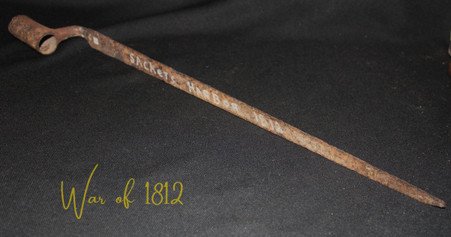 Loading... Please wait...
Loading... Please wait...-
Call us on (973) 810-2976
- My Account
- Gift Certificates
- Items / $0.00
All prices are in All prices are in USD
Categories
- Home
- Identified Artifacts
- War of 1812 U.S. Socket Bayonet, recovered at Sackets Harbor NY Battlefield
- Home
- Excavated Artifacts
- War of 1812 U.S. Socket Bayonet, recovered at Sackets Harbor NY Battlefield
- Home
- Late 18th Century / Early 19th Century
- War of 1812 U.S. Socket Bayonet, recovered at Sackets Harbor NY Battlefield
- Home
- Revolutionary War items
- War of 1812 U.S. Socket Bayonet, recovered at Sackets Harbor NY Battlefield
War of 1812 U.S. Socket Bayonet, recovered at Sackets Harbor NY Battlefield
Product Description
This is another nice early piece coming out of a 60-year collection of French & Indian War, Revolutionary War, and War of 1812 artifacts. Being offered is an excavated U.S. Model 1810 socket bayonet from the War of 1812. It has an overall measurement of 18 ¾” inches. This bayonet was recovered from the fighting at Sackets Harbor NY.
During the War of 1812, Sackets Harbor was the center of United States naval shipbuilding on the Great Lakes and military headquarters of the northern army. On July 19, 1812, the First Battle of Sackets Harbor caused little damage, but the Second Battle of Sackets Harbor on May 29, 1813, was a pivotal event that involved British and Canadian forces with their First Nations allies fighting against United States forces.
The Americans had expected a British attack for months, and had reinforced the town with earthwork fortifications, artillery, and blockhouses. There were about 1,500 soldiers present, about two-thirds volunteer militiamen, and the rest US regulars. Gen. Jacob Brown of the New York militia was the senior American officer present and deployed the regulars in the town’s defenses and the militia outside the perimeter in order to oppose the British landing.
The British attack was initially successful, but in all the confusion their commander ordered a retreat. The U.S. troops, equally confused, burned their own storehouses, and set fire to a warship under construction so they would not fall into enemy hands. Ultimately, the warship was saved and launched.
Though the Crown Forces could not win a decisive battle at Sackets Harbor, neither could the U.S. fleet gain control of Lake Ontario early that summer in their effort to conquer Upper Canada.
The bayonet was a crucial weapon during the Revolutionary and War of 1812. Due to the inaccuracy of the musket, the bayonet charge was used frequently. This triangular-shaped blade would leave a large, easily infected, wound on the victim.
The bayonet has a period repair to the neck because of a crack or break. However, the bayonet is in very solid condition. Highlighted in white paint is what is said to be a “U.S” marking, but very hard to make out.
This collection began in the late 1950s and was created by private acquisitions, closed museums, and from lake divers. The collector meticulously displayed and cataloged every piece along with its provenance. His markings were crude at the time, but now proved to be very important. Many of the pieces went through electrolysis to remove crusted rust.
This is the first time this axe has been on the open market, and it is truly a great piece of early American History. As with all the pieces in this esteemed collection, a Certificate of Authenticity will be included. Sackets Harbor is one of the more difficult sites for excavated artifacts.



